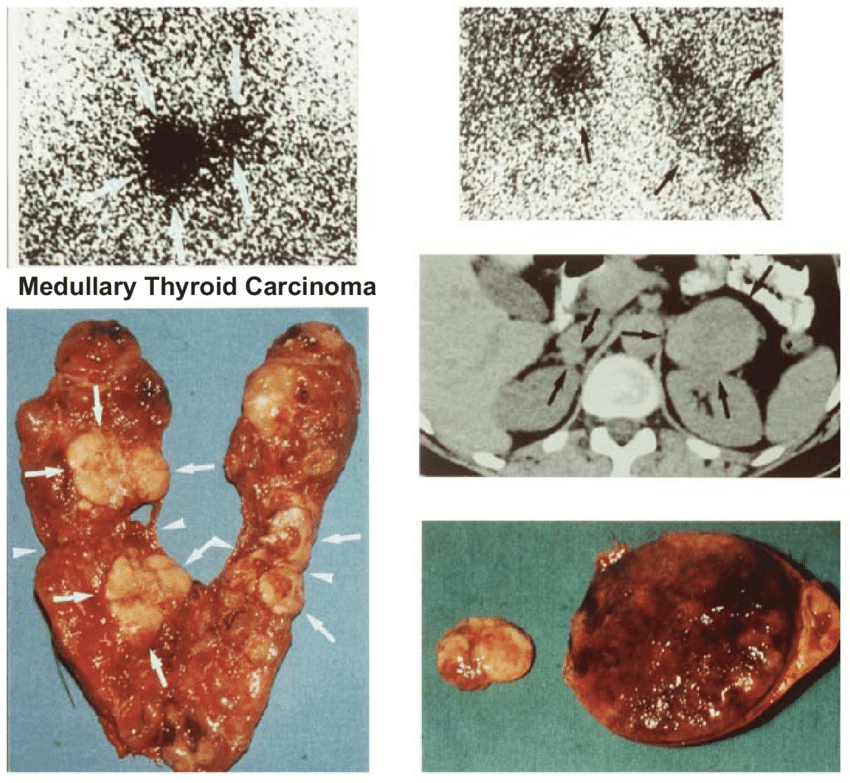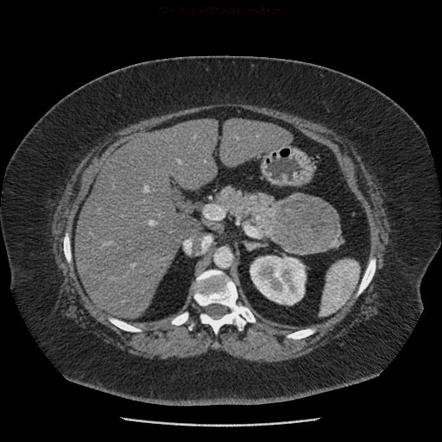Multiple Endocrine Neoplasia (MEN)
Content of This Page
1- Introduction
2- Causes
3- Symptoms
4- Disease Associated With Multiple Endocrine Neoplasia (MEN)
5- Treatment
Introduction
Multiple Endocrine Neoplasia (MEN) is a group of rare genetic disorders that cause tumors to form in multiple endocrine glands. These tumors can lead to overproduction of hormones, which can affect various bodily functions. MEN syndromes are classified into different types (MEN1, MEN2A, and MEN2B), each involving different glands and types of tumors.

Causes
1. MEN1 (Wermer’s Syndrome):
- Genetic Mutation: Caused by mutations in the MEN1 gene, which is responsible for producing a protein that helps regulate cell growth and function.
2. MEN2A (Sipple’s Syndrome):
- Genetic Mutation: Caused by mutations in the RET gene, which is involved in signaling pathways that control cell growth and development.
3. MEN2B:
- Genetic Mutation: Also caused by mutations in the RET gene, but these mutations are different from those in MEN2A and lead to a more aggressive form of the syndrome.
4. Inherited Factors:
- Family History: MEN syndromes are inherited in an autosomal dominant pattern, meaning that having one copy of the mutated gene from an affected parent can lead to the condition.
5. Spontaneous Mutations:
- Occasional Cases: In rare cases, MEN syndromes can arise from new (spontaneous) mutations in individuals with no family history of the condition.
Symptoms
-MEN1 (Wermer’s Syndrome):
- Primary Hyperparathyroidism: High calcium levels causing kidney stones, bone pain, and abdominal pain.
- Pituitary Tumors: Symptoms may include headaches, vision problems, and hormonal imbalances leading to conditions like Cushing’s disease or prolactinomas.
- Pancreatic Endocrine Tumors: Symptoms may vary based on the tumor type but can include abdominal pain, weight loss, and digestive issues.
-MEN2A (Sipple’s Syndrome):
- Medullary Thyroid Carcinoma: Symptoms may include a lump in the neck, changes in voice, or difficulty swallowing.
- Primary Hyperparathyroidism: Similar symptoms to MEN1, including kidney stones, bone pain, and abdominal pain.
- Pheochromocytoma: Tumors in the adrenal glands that can cause high blood pressure, headaches, sweating, and rapid heartbeat.
-MEN2B:
- Medullary Thyroid Carcinoma: Symptoms include neck lumps, changes in voice, and swallowing difficulties.
- Pheochromocytoma: Similar symptoms to MEN2A, such as high blood pressure, sweating, headaches, and rapid heartbeat.
- Mucosal Neuromas: Non-cancerous growths in the mouth, lips, and tongue.
- Marfanoid Habitus: Features resembling Marfan syndrome, such as tall stature and long limbs.
-General Symptoms Across Types:
- Hormonal Imbalances: Symptoms related to excess hormone production, including fatigue, weight changes, and mood changes.
- Tumor-Related Symptoms: Depending on the location and size of tumors, symptoms can include pain, swelling, and functional impairments related to the affected gland.

Disease Associated With Multiple Endocrine Neoplasia (MEN)
-MEN1 (Wermer’s Syndrome):
- Primary Hyperparathyroidism: Often leads to hypercalcemia, which can cause kidney stones, osteoporosis, abdominal pain, and psychiatric symptoms.
- Pituitary Tumors:
- Prolactinoma: Overproduction of prolactin leading to menstrual irregularities in women, erectile dysfunction in men, and galactorrhea (milky discharge from breasts).
- Growth Hormone-Secreting Adenomas: Can cause acromegaly or gigantism.
- Cushing’s Disease: Excessive cortisol production leading to weight gain, high blood pressure, diabetes, and other symptoms.
- Pancreatic Endocrine Tumors:
- Insulinoma: Causes hypoglycemia (low blood sugar), leading to symptoms like sweating, shaking, and confusion.
- Gastrinoma: Causes excessive gastric acid production, leading to peptic ulcers and abdominal pain.
- VIPoma: Produces vasoactive intestinal peptide, leading to severe diarrhea and electrolyte imbalances.
-MEN2A (Sipple’s Syndrome):
- Medullary Thyroid Carcinoma (MTC): A type of thyroid cancer that can present as a lump in the neck, changes in voice, and swallowing difficulties.
- Primary Hyperparathyroidism: Similar issues as in MEN1, including hypercalcemia, kidney stones, and bone pain.
- Pheochromocytoma: Tumors of the adrenal glands that cause high blood pressure, headaches, sweating, and palpitations.
-MEN2B:
- Medullary Thyroid Carcinoma (MTC): Similar to MEN2A, with symptoms including neck lumps and swallowing difficulties.
- Pheochromocytoma: Causes symptoms like high blood pressure, sweating, headaches, and rapid heartbeat.
- Mucosal Neuromas: Benign growths in the mucous membranes of the mouth, lips, and tongue.
- Marfanoid Habitus: Features resembling Marfan syndrome, including tall stature, long limbs, and joint laxity.
- Ganglioneuromas: Tumors of nerve tissue, which may affect various body functions.
Treatment
-MEN1 (Wermer’s Syndrome):
- Primary Hyperparathyroidism:
- Surgical Removal: Parathyroidectomy to remove overactive parathyroid glands.
- Medications: To manage calcium levels if surgery is not immediately feasible.
- Pituitary Tumors:
- Medications: For hormone-secreting tumors (e.g., dopamine agonists for prolactinomas, somatostatin analogs for growth hormone-secreting tumors).
- Surgery: To remove the tumor if medication is not effective.
- Radiation Therapy: For tumors not amenable to surgery.
- Pancreatic Endocrine Tumors:
- Surgical Removal: To excise tumors causing symptoms or functional issues.
- Medications: To control symptoms of hormone overproduction (e.g., proton pump inhibitors for gastrinomas).
- Supportive Care: Management of symptoms like hypoglycemia or diarrhea.
-MEN2A (Sipple’s Syndrome):
- Medullary Thyroid Carcinoma (MTC):
- Surgical Removal: Total thyroidectomy to remove the thyroid gland and any cancerous tissue.
- Primary Hyperparathyroidism:
- Surgical Removal: Parathyroidectomy to address hypercalcemia and associated symptoms.
- Pheochromocytoma:
- Surgical Removal: To remove the adrenal tumor.
- Medications: Alpha-blockers and beta-blockers to manage blood pressure before surgery.
-MEN2B:
- Medullary Thyroid Carcinoma (MTC):
- Surgical Removal: Total thyroidectomy as early as possible due to the aggressive nature of the cancer.
- Pheochromocytoma:
- Surgical Removal: To excise the adrenal tumor.
- Medications: To control blood pressure and symptoms before surgery.
- Mucosal Neuromas:
- Symptomatic Treatment: Management of symptoms and regular monitoring.
- Marfanoid Habitus:
- Supportive Care: Management of associated symptoms and potential complications.